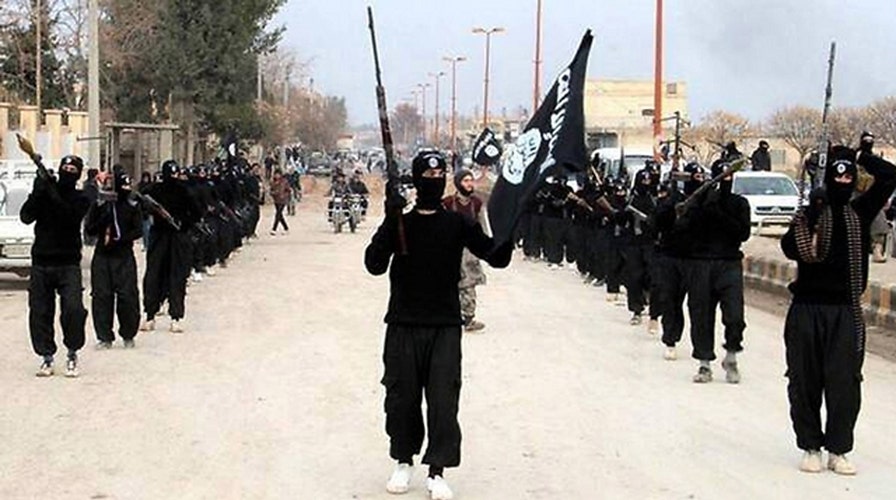11 killed in ISIS attack at Iraq power plant
ISIS fighters strike back after offensive on Mosul
IRBIL, Iraq – Islamic State militants armed with assault rifles and explosives attacked targets in and around the northern Iraqi city of Kirkuk early Friday, in an assault that appeared aimed at diverting Iraqi security forces from a massive offensive against the ISIS-held city of Mosul.
At least 13 workers, including four Iranians, were killed when ISIS militants stormed a power plant north of Kirkuk and then blew themselves up. A local TV reporter was killed by a sniper while covering the clashes in Kirkuk city, which were still raging after sundown.
Multiple explosions rocked the city, and gunfire rang out from the area around the provincial headquarters, where the fighting was concentrated. Smoke billowed over the city, and the streets were largely deserted out of fear of militant snipers.
ISIS said its fighters targeted the provincial headquarters, in a claim carried by its Aamaq news agency.
Three suicide bombers stormed a power plant in the town of Dibis, north of Kirkuk, killing 13 workers, including four Iranian technicians, before blowing themselves up as police arrived, said Maj. Ahmed Kader Ali, the Dibis police chief.
Iran's Foreign Ministry spokesman Bahram Ghasemi condemned the Kirkuk assault, which he said killed four Iranians and wounded three others, according to the official IRNA news agency. It was not immediately clear if Iranians were targeted in other attacks.
The Turkmeneli TV station, which had earlier shown live footage of smoke rising from outside the provincial headquarters, said in a news bulletin that one of its reporters, Ahmet Haceroglu, was killed by a sniper while covering the fighting.
There was no immediate word on casualties among other civilians or Kurdish forces in Kirkuk city. Police and hospital officials could not be reached for comment.
Kirkuk is some 100 miles from the Islamic State-held city of Mosul, where Iraqi forces have been waging a wide-scale offensive since Monday.
ISIS has in the past resorted to suicide bombings in and around Baghdad in response to battlefield losses elsewhere in the country. But the complex assault in Kirkuk more closely resembled those carried out by the Taliban in the Afghan capital, Kabul.
Kirkuk, some 180 miles north of Baghdad, is an oil-rich city claimed by both Iraq's central government and the largely autonomous Kurdish region. Kurdish forces assumed full control of Kirkuk in the summer of 2014, as Iraq's army and police crumbled in the face of a lightning advance by ISIS.
Kemal Kerkuki, a senior commander of Kurdish peshmerga forces west of Kirkuk, said the town where his base is located outside the city also came under attack early Friday, but that his forces repelled it.
He said ISIS maintains sleeper cells in Kirkuk and the surrounding villages. "We arrested one recently and he confessed," he said, adding that the attackers may have posed as displaced civilians in order to infiltrate the city. Kirkuk province is home to hundreds of thousands of people displaced by the conflict.
Iraqi and Kurdish forces backed by a U.S.-led coalition launched a multi-pronged assault this week to retake Mosul and surrounding areas from ISIS. The operation is the largest undertaken by the Iraqi military since the 2003 U.S.-led invasion.
Iraqi forces advanced as far as Bartella, a historically Christian town some nine miles from Mosul's outskirts, by Thursday.
An Associated Press reporter traveling with the Iraqi special forces on Friday saw homes along Bartella's main road painted with ISIS graffiti, including the first Arabic letter in a derogatory word for Christians, which is used by the militants to mark Christian property. Under ISIS rule, Christians must convert to Islam or pay a special tax.
ISIS militants had sprayed graffiti on the inside walls of the town's church as well. Iraqi soldiers raised the national flag over the building and rang the church bell, signaling its liberation.
"Bartella was liberated yesterday, and today we are inside its church," Lt. Gen. Talib Shaghati said. "I bring the good news to our Christian brothers that the church is liberated."
Elsewhere in Iraq, the country's top Shiite cleric called on forces taking part in the Mosul offensive to protect civilians, and for residents of Mosul, a mainly Sunni city, to cooperate with security forces.
"We stress today upon our beloved fighters, as we have before on many occasions, that they exercise the greatest degree of restraint in dealing with civilians stuck in the areas where there is fighting," the reclusive Grand Ayatollah Ali al-Sistani said in a Friday sermon read by an aide. "Protect them and prevent any harm to them by all possible means."
Some 3,900 people, or about 650 families, have fled Mosul and the nearby Hamdaniyah district since the operation began this week, according to Adrian Edwards of the U.N. refugee agency.
Ravina Shamdasani, of the U.N. human rights office, said it had "verified information" that IS had forced 550 people to relocate to Mosul from the nearby villages of Samalia and Najafia on Monday, part of an "apparent policy of preventing civilians from escaping to areas controlled by Iraqi security forces."
Shamdasani reiterated concerns IS could use civilians as human shields, and said the office was investigating reports that the group had killed at least 40 civilians for suspected disloyalty. She declined to elaborate on the reports, citing "security reasons."

